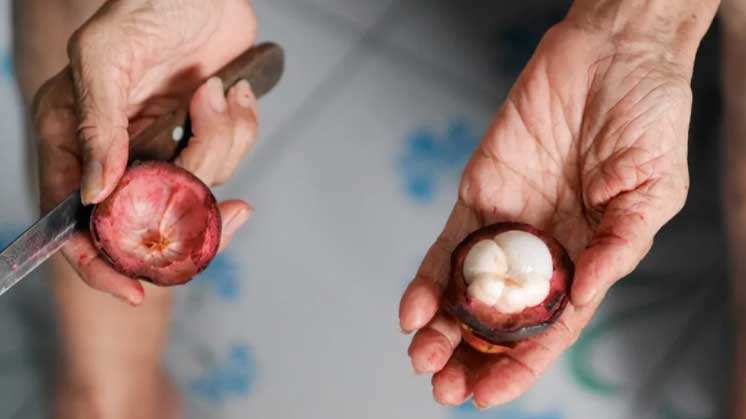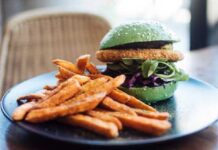
Mangosteen is a small purple fruit that grows in Southeast Asia. In recent years, news reports and internet influencers have said the fruit has a range of health benefits. It now has a reputation as a “superfood.”
This article will outline what a mangosteen is, look at the science behind the health benefit claims, and explain how to eat mangosteen.
What Is A Mangosteen?
Mangosteen is a small, purple fruit from Southeast Asia. It has a hard outer skin and sweet, white, juicy flesh. People have described its taste as a mix of lychee, peach, strawberry, and pineapple.
Farmers tend to grow mangosteen in Indonesia, Malaysia, Sri Lanka, the Philippines, and Thailand. In these countries, people consume it as:
- fruit
- juice
- traditional medicine
Fresh mangosteen is hard to find in the United States for two reasons.
First, mangosteen trees need a fully tropical climate and lots of time to grow. Small farms in Hawaii and Puerto Rico, started in the 1990s, are only now starting to bear fruit.
Second, fresh mangosteen can harbor quarantine pests or non-U.S. native bugs that could threaten the ecosystem. It means mangosteen importers must sterilize the fruit before it enters the country. This sometimes affects the quality, taste, or shelf life.
Benefits Of Mangosteen
Mangosteen has many benefits. It contains a range of compounds and substances that are good for human health.
The benefits of mangosteen include:
Highly Nutritious
According to the U.S. Department of Agriculture, all fruits provide nutrients that are vital for good health.
One cup of drained, canned mangosteen contains:
- 143 kcal
- 35.1g of carbohydrate
- 3.53g of dietary fiber
- 23.5mg of calcium
- 94.1mg of potassium
- 5.68mg of vitamin C
Most fruits, including mangosteen, are low in fat, sodium, and calories, helping people maintain a moderate weight. They are also free from cholesterol, which can contribute to chronic conditions such as heart disease and type 2 diabetes.
Fruit is also a good source of nutrients that people in the U.S. often lack, such as:
- potassium, a mineral needed to help maintain healthy blood pressure
- dietary fiber, which helps people maintain a healthy gut
- vitamin C, which helps the body to heal cuts and wounds and to keep teeth and gums healthy
Contains Antioxidants
Antioxidants fight free radicals or harmful substances that can build up inside the body. Free radicals can contribute to health problems including:
Studies have suggested that mangosteen contains antioxidants. One study from 2015 asked 30 people to drink a mangosteen-based beverage every day for 30 days. Researchers compared their blood to that of 30 people who had consumed a non-mangosteen-based drink or placebo.
At the end of the 30 days, the mangosteen group had 15% more antioxidants in their bloodstream than the placebo group.
Anti-inflammatory
Inflammation is a normal part of the immune system. It is the body’s way of removing foreign substances, like bacteria, viruses, or chemicals.
Sometimes, inflammation happens unnecessarily. Other times, it continues after the body has removed the threat. Doctors call this chronic inflammation. It can contribute to health problems including:
- cancer
- heart disease
- diabetes
- arthritis
- depression
- Alzheimer’s disease
In the 2015 study outlined above, scientists found that mangosteen may also act as an anti-inflammatory. They concluded this by measuring the C-reactive protein, a substance that signals inflammation levels. Over the 30 days of the study, levels of this protein in the mangosteen group reduced by an average of 46%.
Medicinal Properties
Some medicines include mangosteen as an ingredient, including:
- metratrim, a medicine that also contains Sphaeranthus indicus and may help people who have obesity or overweight lose weight
- a gel with 4% mangosteen can help with loose teeth and bleeding in people with serious gum disease, or periodontitis
- some moisturizers for oily skin
Potential Drawbacks
It is important to note that studies on the health benefits of mangosteen have been small so far. Scientists need more research before they can be sure.
The National Library of Medicine says that there is not enough evidence to say that mangosteen can help with:
- diarrhea
- dysentery
- eczema
- gonorrhea
- menstrual disorders
- thrush
- tuberculosis
- urinary tract infections
It also advises against using mangosteen medicines in the following situations:
- when pregnant or breastfeeding, as there is not enough evidence to say it is safe
- if the person has a bleeding disorder, as mangosteen may slow blood clotting
- for two weeks before surgery, as it may increase the risk of bleeding during or after an operation
Mangosteen and other herbal supplements may also interact with some medications, such as liraglutide (Saxenda).
How To Eat Mangosteen
People can peel the outer skin of the mangosteen and eat the wedges of fruit inside raw.
However, fresh mangosteen is hard to find in the U.S. Lots of mangosteen-based products, including supplements and juices, are available for people who would like to gain the health benefits of mangosteen but have difficulty finding fresh fruit.
Things to bear in mind with these products include the following:
- Some mangosteen juices contain only small amounts of fruit.
- Fruit juices do not contain the same dietary fiber as fresh fruits.
- Mangosteen may lose some of the substances that give it potential health benefits when manufacturers make the fruit into juices or supplements.
Summary
Mangosteen is a small purple fruit that grows in Southeast Asia. It is difficult to grow and import into the U.S.
Studies have suggested that the fruit has antioxidant and anti-inflammatory properties. However, there is not yet enough evidence to conclusively prove this.
Some medicines include mangosteen as an ingredient. These include drugs for obesity and gum disease. People who are pregnant, nursing, have a blood disorder, or are about to have an operation should avoid mangosteen-based medicines.
Sources:
- Free radical. (n.d.).
https://www.cancer.gov/publications/dictionaries/cancer-terms/def/free-radical - Fruits. (n.d.)
https://www.myplate.gov/eat-healthy/fruits - Gutierrez-Orozco, F., et al. (2013). Biological activities and bioavailability of mangosteen xanthones: A critical review of the current evidence.
https://www.ncbi.nlm.nih.gov/pmc/articles/PMC3775248/ - Karp, D. (2010). Commercialization of mangosteen in the United States: domestic cultivation, imports and marketing [Abstract].
https://www.cabdirect.org/cabdirect/abstract/20103079746 - Mangosteen. (2020).
https://medlineplus.gov/druginfo/natural/1081.html#:~:text=Special%20precautions%20%26%20warnings%3A&text=Taking%20mangosteen%20might%20increase%20the,mangosteen%202%20weeks%20before%20surgery - Xie, Z., et al. (2015). Daily consumption of a mangosteen-based drink improves in vivo antioxidant and anti-inflammatory biomarkers in healthy adults: A randomized, double-blind, placebo-controlled clinical.
https://www.ncbi.nlm.nih.gov/labs/pmc/articles/PMC4534161/
Important Notice: This article was originally published at www.medicalnewstoday.com by Amanda Barrellwhere all credits are due. Medically reviewed by Grant Tinsley, Ph.D., Nutrition.
Disclaimer
The watching, interacting, and participation of any kind with anything on this page does not constitute or initiate a doctor-patient relationship with Dr. Farrah®. None of the statements here have been evaluated by the Food and Drug Administration (FDA). The products of Dr. Farrah® are not intended to diagnose, treat, cure, or prevent any disease. The information being provided should only be considered for education and entertainment purposes only. If you feel that anything you see or hear may be of value to you on this page or on any other medium of any kind associated with, showing, or quoting anything relating to Dr. Farrah® in any way at any time, you are encouraged to and agree to consult with a licensed healthcare professional in your area to discuss it. If you feel that you’re having a healthcare emergency, seek medical attention immediately. The views expressed here are simply either the views and opinions of Dr. Farrah® or others appearing and are protected under the first amendment.
Dr. Farrah® is a highly experienced Licensed Medical Doctor certified in evidence-based clinical nutrition, not some enthusiast, formulator, or medium promoting the wild and unrestrained use of nutrition products for health issues without clinical experience and scientific evidence of therapeutic benefit. Dr. Farrah® has personally and keenly studied everything she recommends, and more importantly, she’s closely observed the reactions and results in a clinical setting countless times over the course of her career involving the treatment of over 150,000 patients.
Dr. Farrah® promotes evidence-based natural approaches to health, which means integrating her individual scientific and clinical expertise with the best available external clinical evidence from systematic research. By individual clinical expertise, I refer to the proficiency and judgment that individual clinicians acquire through clinical experience and clinical practice.
Dr. Farrah® does not make any representation or warranties with respect to the accuracy, applicability, fitness, or completeness of any multimedia content provided. Dr. Farrah® does not warrant the performance, effectiveness, or applicability of any sites listed, linked, or referenced to, in, or by any multimedia content.
To be clear, the multimedia content is not intended to be a substitute for professional medical advice, diagnosis, or treatment. Always seek the advice of your physician or other qualified health providers with any questions you may have regarding a medical condition. Never disregard professional medical advice or delay in seeking it because of something you have read or seen in any website, video, image, or media of any kind. Dr. Farrah® hereby disclaims any and all liability to any party for any direct, indirect, implied, punitive, special, incidental, or other consequential damages arising directly or indirectly from any use of the content, which is provided as is, and without warranties.








